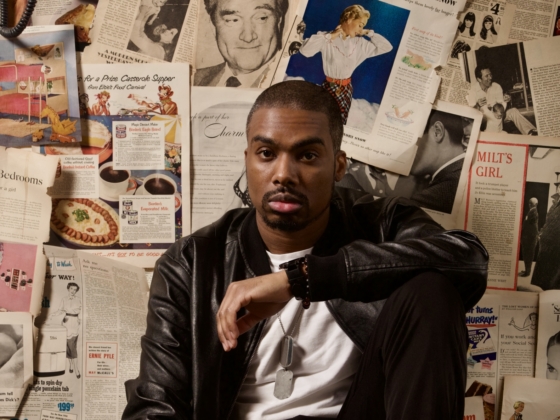When most bands experience lineup changes, the most logical step to take for a new album is to have it serve as a reintroduction to the band. Paramore’s self-titled record and blink-182’s One More Time spring to mind.
The Happy Fits’ newest record takes it one step further; it’s a re-meet cute.
Lovesick, the band’s fourth studio album, is their first since guitarists Raina Mullen and Nico Rose stepped in to replace founding member Ross Monteith. Its aesthetic does away with that of previous albums, relegating the symbolic fruit, the apple, to a single artwork rather than the album cover.
Instead, the album cover depicts butterflies, a flower, and giant lips in the sky, ready for a kiss.
Opener “Do You See Me?” describes the feeling of realizing you are in love with the person you’re with. "While the relationship is still in its honeymoon phase, you can’t stop thinking about them. The song opens with a subdued delivery, with Calvin Langman’s lead vocals gradually becoming clearer in the mix, initially accompanied only by acoustic guitar and cello. By the midpoint, distorted guitars and Luke Davis’s drumming kick in with full energy.
The energy picks up significantly on lead single “Everything You Do,” which flashes back to the couple’s initial meeting and the protagonist’s feelings of love at first sight. Their feelings preoccupy them from thinking about their dire financial situation. The track properly introduces Mullen and Rose as key players by giving them a full bridge to sing, and they sound marvelous harmonizing alongside Langman.
On "Cruel Power, "Davis’s elation is palpable in the way he drives the kick drum at high speed. Langman sings about the object of his affections being taken, grappling with the idea of remaining just friends. Rose and Mullen’s guitar work perfectly complements his fascination with this person.
“Lovesick #1 (Misery)” is one of two times Mullen takes center stage on the record. Here, it’s for a throwback ballad-turned-banger that sonically places the listener in a fancy nightclub. From there, the band blows the roof off with a winning combo of Davis’s gutsy drumming, Rose’s glamorous strumming, and Langman’s harmonization with Mullen’s strong vocals. The lyrics find the protagonist switching from agonization to resignation over their feelings not being reciprocated.
On “Miss You,” Mullen and Langman’s voices blend together so well that they become almost indistinguishable from each other. The lyrics return to the humble beginnings of the relationship, where you find yourself unwilling to ever be apart. The narrator resolves to bring their partner on a getaway trip. The composition brings the speed down just a bit, leading to a fun listen.
“The Nerve” brings the narrator to the realization that they never deserved their love interest’s affection to begin with and only liked them for their superficial similarities. They have grown up since that first meeting and are now trying to shed their narcissistic tendencies. The instrumentation is driven by both acoustic and electric guitar, as well as what sounds like synths and tambourine.
“I Could Stare at You for Hours” is the first true-blue ballad on the album, with Langman crooning on cello and accompanied by acoustic guitar. Towards the end, it gives way to more strings and even brass instruments before they fade away. The lyrics detail longing for someone to notice how much you love them.
Those same elements fade back in on “Sarah’s Song,” which utilizes them for a great sing-along number.
Additions include light drumming, whistling, and handclaps, along with lyrics encouraging the titular character not to get bogged down by life’s negatives, as they help make the positive moments feel even more meaningful.
On “Shake Me,” Langman puts on a sassy vocal performance set to retro-leaning guitars and nostalgic lyrics about wanting to feel the way you did when you first met someone, as opposed to the dull routine you find yourselves in.
“(I Still Think) I Love You” follows up by showing the aftermath. The couple has broken up, but the narrator has come to regret ending things and still feels love for their former partner. The music is not somber; rather, it sounds like an effort to serenade and win their ex back.
“Wild in Love” gets Davis on the mic to trade vocals with Langman, and his deeper delivery fits the 80s-esque production of the song like a glove. The guitars are gritty, and the drums are naturally bouncy. The lyrics show off an internal debate on whether to give in to anxiety that a relationship will fail or affection that makes one carefree.
“Black Hole” conjures space imagery with its production, sounding like the band is in such a vacuum. The whirling guitars and lyrics about recognizing how toxic a guy is for you aid this narrative so well.
“Superior” is where the bass makes its biggest mark, booming to make itself heard amongst an overall composition suited for a slow dance. The lyrics regarding the reminders you get every so often about an ex leave a depressing feeling, exacerbated by Langman and Mullen’s sailing vocals.
The song’s ending voicemail leads directly into “Wrong About Me,” a ballad that shifts to the ex’s perspective. Over acoustic fingerpicking and cello, Langman laments the broken state the ex is in, saying that maybe they were not ready for that relationship.
“I Remember” wraps things up with a five-minute jam that evokes optimism for the future through its flanged guitars and delightfully distant drums. Our protagonist has accepted getting older and let go of their mindless infatuation, only wishing now to make amends.
Lovesick fittingly wears its overarching theme on its sleeve, consistently finding innovative ways to convey the same feelings over and over again while rarely getting tired.
The 15-song collection works better than it should, thanks primarily to its lyricism and Ayad Al-Adhamy’s production, and signals that The Happy Fits are still worth the devotion they earned from their work thus far.
Connect with The Happy Fits: Instagram








